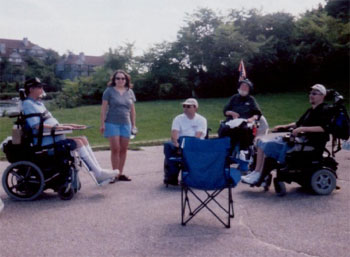Program Details
Click on one of the links below to jump to that part of the page:
Training seminars provided educational information, skills training, and peer support in the areas of independent living, and health promotion. Project staff and presenters had the experience and expertise to provide training in all selected areas. Peer support and peer mentoring was an important facet of this component of the program, as people learned from each other’s experiences and adopted healthy role models for growth, personal change, and increased participation in community life. All presentations used simple, non-technical language.
Click on one of the activies below for more information.
Team Building
Develop trust, respect and teamwork within the group.Self Advocacy & Goal Setting
Speaking up for yourself, and problem solving to achieve personal goals.Speaking to Medical Professionals
Strategies for improving communication with health care professionals.Assistive Technology
An introduction to adaptive equipment (e.g. wheelchairs, hand controls, buttoners, etc.)Sexuality & Relationships
This seminar will provide lecture and discussion on the physiological, psychological and emotional aspects of sexuality and disability.Medication Management & Substances Interactions
Health professionals and peer mentors will present strategies for medication management and educate about substance interactions.Nutrition & Skin care
Education on proper hydration and nutrition and the prevention of pressure sores.Bowel & Bladder Maintenance
The basics of the urinary system and bowel functioning and the importance of healthy bladder and bowel care and management.
Recreational Activities
Participants engaged in a series of adaptive indoor and outdoor recreational activities. Many individuals with MS had not participated in activities such as cycling and boating since the onset of their disability and did not realize that such activities were even possible for them. Participants found these experiences empowering and motivating as they realize how much they can still do. Peer support was a crucial component to this process as participants served as role models and mentors for each other.
It was inspiring for participants to view the achievements of someone with a physical impairment that was similar or even more severe than their own, causing them to recognize that they too could achieve these goals. Research suggests that this change of attitude related to physical activity is generalized and applied to other life areas, such as education and employment. Including individuals with differing mobility together in the same program lead to opportunities for interdependence, teamwork, and peer support as participants used their individual capacities to help each other and work together.
Consultation was provided for any participants who wished to continue any of the sports or activities outside of the program.
Click on one of the activies below for more information.
Strength and Conditioning
Develop tailored individualized strength and conditioning programs.Self Defense
Learn practical strategies for decreasing your vulnerability and increasing your personal safety.Meditation, Tai Chi, Yoga
Workshops on the topic of Meditation, Tai Chi & Yoga follow similar formats, introducing strategies for relaxation, stress reduction, and increased flexibility.Sailing
Learn to sail using adaptive Freedom Twenty sailboats.Kite Flying
Kite flying will provide participants the opportunity to fly a variety of stunt kites using proper adaptations. Adaptations such as wrist straps and mouthpieces are used for individuals who have limited or no upper arm/hand functioning.Handcycling
Participants will see a variety of models of handcycles. Participants will experience riding different handcycles that are appropriate to their functional level.Kayaking
The kayaking module provides participants the opportunity to experience sea kayaking. Participants learn about the fundamentals of kayaking, basic paddling techniques, water safety and adaptations.SCUBA
The SCUBA module provides a SCUBA experience for participants in a pool environment. Participants are introduced to the equipment needed for SCUBA diving as they experience diving underwater with an adaptive, certified SCUBA instructor.Waterskiing
Participants will be exposed to adaptive water-skiing equipment and will experience water-skiing in a sit ski on a lake or ocean.Fishing
The goal of this activity is to introduce participants to fishing in the outdoors at an accessible fishing site.Sled Hockey
This sport is similar to ice hockey but players check each other with the sled.Court Sports
The goal of court sports is to introduce the group to a variety of wheelchair sports that may be played in an outdoor/indoor court.
Interview 1 |
|
Text: Transcript |
Interview 2 |
Text: Transcript | |
Interview 3 |
Text: Transcript | |
Interview 4 |
Text: Transcript |


